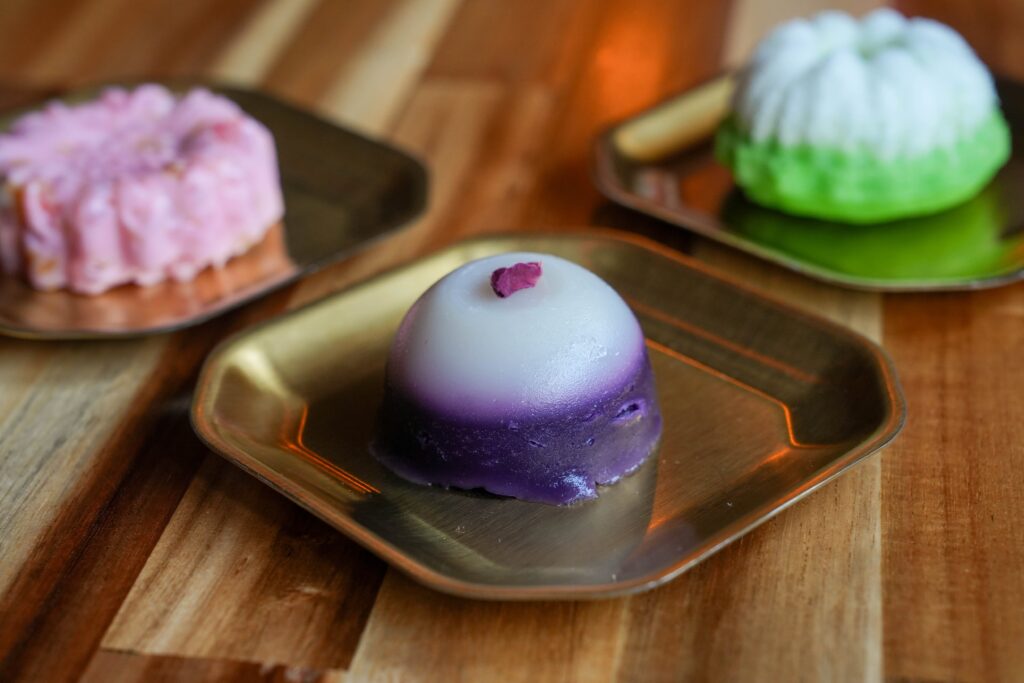You could wander your way around Pasar’s menu for weeks before landing on the lontong cap go meh, a creamy coconut soup filled with firm white tofu, nutty brown tempeh, gently compressed rice cakes, a sambal-coated egg and two types of chips — pastel-rimmed onion and tapioca and house-made potato.
The soup sits at the end of a long section labeled “makanan,” Indonesian for “food,” though here implying larger dishes at a restaurant better known for its snacks. At $20, it’s one of the more expensive things on the menu.
Yet this electrifying lontong cap go meh, with its array of colors, flavors and textures, is essential for understanding the Northeast Portland restaurant, and a decent place to start for anyone curious about the Chinese influence on Indonesian food.
But let’s back up. With 285 million residents, 17,500 islands, hundreds of living languages, six major faiths and at least as many distinct culinary regions, Indonesia can hardly be boiled down to a single dish. Even a large Indonesian restaurant menu will only be a page pulled from a larger book.
But if any chef has handed Portland a library card, it’s Feny, the co-owner of Wajan and Pasar who goes, as is common in Indonesia, by one name. Instead of inventive fusion or technical fireworks, Feny has leaned on her own deep experience with Indonesia — she was born and raised in Jakarta, her family comes from Medan in North Sumatra — to launch three local food businesses over the past 15 years.
Indonesian food, an introduction
That started with Wayang House, the modest yellow-brown camper that Feny opened in the old Ninth and Alder pod, shortly after moving to town in 2010, at the peak of Portland’s food cart mania. And it continued in 2019 with the debut of Wajan, a cafe-sized restaurant that Feny and partner Ross Grimes opened with a charming patio and several dishes — fried egg pockets, coconut-braised beef rendang, tender pork skewers doused in sweet peanut sauce and other Indonesian staples — in the original North Tabor home of Mike’s Drive-In.
Feny’s desire to introduce more Indonesian dishes to Portland — and a pandemic switch to selling snack boxes out of Wajan — is the inspiration behind Pasar’s menu, or at least half of it. As Feny tells it, as a child in Jakarta, her mother would often take her shopping at the morning markets, or pasar, to buy groceries, munch on fried snacks called gorengan and stock up on the colorful cakes known as kue.
Cantik manis, talam ubi and putu ayu are among the bite-sized desserts at Pasar, an Indonesian restaurant in Northeast Portland.
Vickie Connor/The Oregonian
Indonesia has a rich tradition of frying foods, so it’s no surprise that Pasar, like Wajan before it, serves a very good selection of crunchy bites inside the former Vita Cafe, an L-shaped dining room now filled with batik motifs, wood-carved shadow puppets and a thatched-roofed bar modeled after a warung, or roadside stall.
That includes the bala-bala fritter, a small raft of fried veggies with an enviable crunch; the martabak daling, a cousin to the golden-fried egg pocket at Wajan stuffed here with spiced ground beef (I prefer Wajan’s version, but this one is good too); and two types of fried roll — the popiah, a simple jicama-carrot spring roll; and the risol sayur, with its mixed veggies wrapped in a thicker, craggier wrapper. You could start your meal with a small bowl of peanuts and dried anchovies, some Indonesian beef jerky, or a salad tossed in sweet peanut or tamarind dressing. But these fried things — specifically as a quartet in the gorengan combo ($16) are a must-order.
The gorengan combo features a spring roll, fritter, crispy pastry and fried curry spiced ground beef and egg at Pasar, an Indonesian restaurant in Northeast Portland.
Vickie Connor/The Oregonian
Like the Brits with their tea biscuits, the Indonesian sweet tooth doesn’t wait for the end of the day to emerge (and this review will do the same). Those colorful, almost
luminous
kue — tiny coconut and tapioca cakes in dazzling shades of pandan green (the coconut-topped putu ayu), ube purple (jiggly talam ubi) and princess pink (floral-shaped cantik manis) — have become the restaurant’s calling card, affordable enough at $3.50 that you can order three or four and still have room for the $5 piscok, a decadent deep-fried banana spring roll drizzled with melted chocolate.
Pasar, an Indonesian restaurant in Northeast Portland, features a brightly decorated dining room and bar.
Vickie Connor/The Oregonian
While I like the cakes, be forewarned that they are more subtle than sweet, and can seem, to my taste, focused more on nailing a specific color than wowing you with flavor. (I feel the same way about the cocktails at both Wajan and Pasar, which often pop visually but aren’t always in balance; my go-to drink is the ghostly green iced melon and condensed milk soda.) Still, it’s easy to imagine these kaleidoscopic kue standing out at a market stand, and it’s not like I’m
not
going to order a cake or three.
But over time, a different aspect of the menu has started to intrigue me more.
Chinese-Indonesian specialties
Fried snacks and cakes weren’t the only things Feny and her mother would get on their trips to the morning market. It was also a place to pause for a bowl of lontong cap go meh, the curry soup that — like Feny herself — merges Chinese and Indonesian culture.
Sometimes referred to as Peranakan cuisine, though Feny says a more common slang term these days is “Chindo,” this aspect of Indonesian food is equally well represented at Pasar, with its street-style fried rice, sweet-and-sour fish and fried pork belly that wouldn’t be out of place at a Hong Kong BBQ spot.
And then there’s the lontong cap go meh, a delightful coconut curry soup that Feny describes as a “unique marriage between Chinese immigrants and local Indonesians,” a dish designed to celebrate the lunar new year with Chinese tofu and rice cakes blended with tempeh in a distinctly Indonesian broth.
For a restaurant aimed at introducing Indonesian food to Portland, Pasar doesn’t always make it easy to know what you’re in for. The lontong cap go meh, for example, lists its ingredients as “fried tofu” (got it), “tempe orek” (Ok), “telor balado” (a hard-boiled and fried egg smothered in sambal), “kripik kentang” (house spiced potato chips) and “krupuk bawang” (onion-tapioca chips). Meanwhile, a sandwich board out front entices customers indoors for the “biji salak.” If you weren’t already familiar with the dessert — a bowl of colorful sweet potato and tapioca balls in a warm coconut cream broth — would you be tempted indoors?
Some restaurants might list that lontong cap go meh in a larger font, or surround it with a little box, denoting it as a specialty. As is, it took me five visits to find it. Now it’s my favorite thing at Pasar.
Details:
Pasar serves dinner Wednesday-Sunday and lunch on weekends at 3023 N.E. Alberta St., 503-477-8232,
pasarpdx.com
Recommended:
With a menu spanning two distinct concepts and nearly 40 dishes, including sides, Pasar can be overwhelming on a first visit.
My initial plan of attack — go with friends and order as much of the menu as possible — isn’t a terrible idea. But lately, I’ve been honing in on the menu’s Chinese-Indonesian side, with dishes include the nasi goreng tek tek (push-cart style fried rice), ikan asam manis (sweet-and-sour cod) and babi goreng (fried pork belly).
For first timers or those dining alone, the lontong cap go meh, another uniquely Chinese-Indonesian combination, is a must. Larger groups should start with the gorengan combo, a basket of four of the restaurant’s tastiest fried snacks. Adding a round of Indonesia’s shrimp chips or a flight of sambal might not be a bad idea, but do check the rest of your order for duplicates, as many dishes already come with a specific sambal or chip as a topping.
And yes, save room for a cake or three, though considering how small they are, that shouldn’t be hard.
Vegetarian options:
Dishes that are vegetarian and vegan (as well as gluten-free or pescatarian) are clearly marked, just as you might expect from the country that gave us tempeh, with many additional options — including the lontong — available without fish sauce or shrimp paste upon request.
Accessibility:
Pasar is on a single level with plenty of room for wheelchairs.
Public transportation:
TriMet bus line 72 is your best bet, though the 17 and 70 also stop nearby.
— Michael Russell;
mrussell@oregonian.com
Stories by
Michael Russell
-
‘Top Chef’ finalist Doug Adams to open new Portland supper club Friday
-
You won’t believe what time customers started lining up for Jollibee’s Oregon opening
-
New Hayden Island snack bar Pal’s brings taste of Suttle Lodge to Portland




More Stories
At Pasar, Indonesian snacks and tiny cakes entice. Don’t ignore the menu’s other half (review)
At Pasar, Indonesian snacks and tiny cakes entice. Don’t ignore the menu’s other half (review)
At Pasar, Indonesian snacks and tiny cakes entice. Don’t ignore the menu’s other half (review)